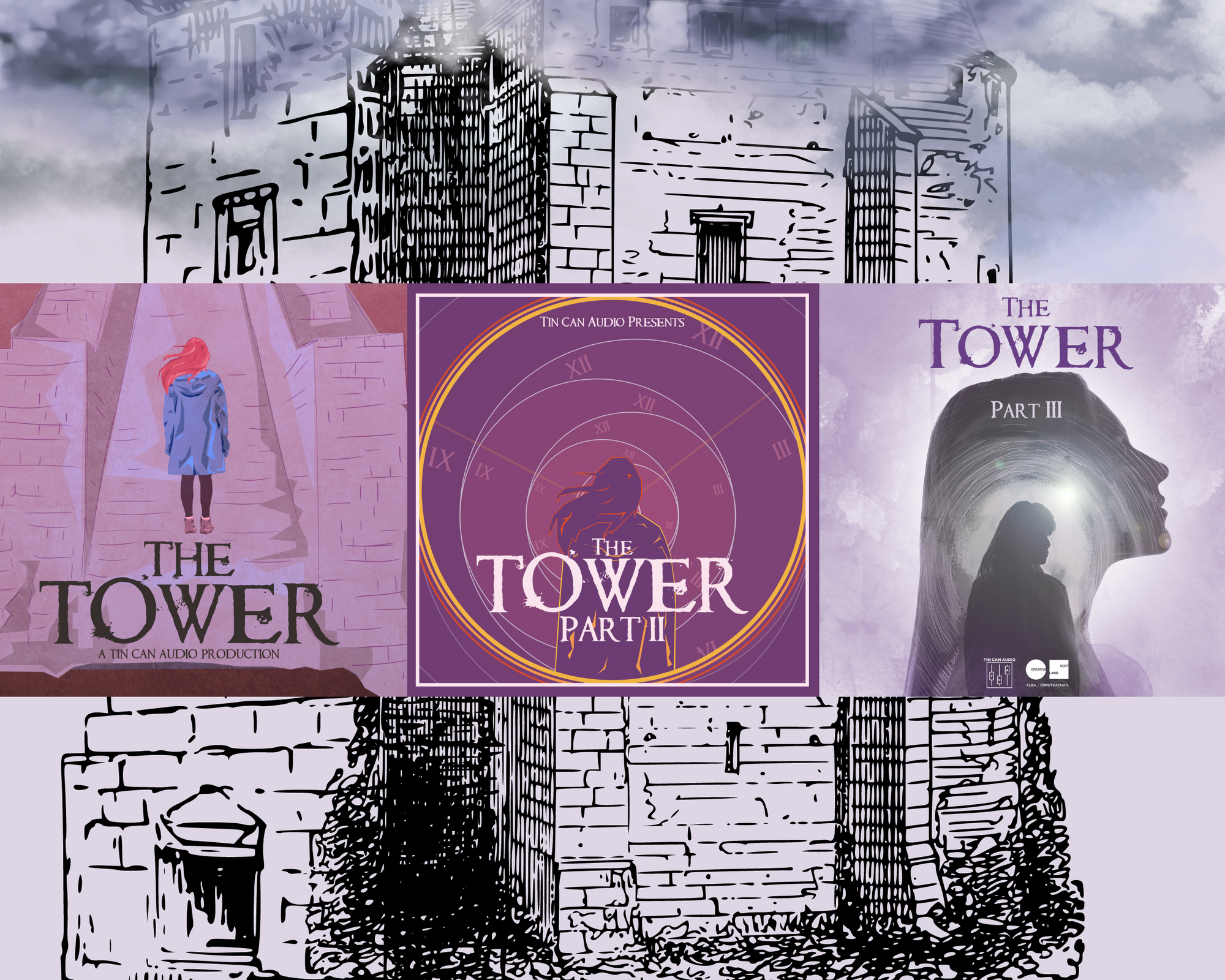An Experiment with Terror and Tenderness in "The Tower"
by Roshan Singh Sambhi

'You okay?'
'Yeah, weirdly. I just made a decision.'
'Oh yeah?'
'Yeah...I'm going to climb the Tower.'
The Tower, Episode 1.1
The Tower begins with a difficult phone call.
Kiri, a young woman living in the city, has had enough of her life. She rings up her partner, Chris, to tell him that she’s made her decision: she’s going to climb The Tower.
Chris is baffled. The Tower – seemingly endless, about which little is known, and that climbers don’t always return from? He begs her not to throw away her life like this. The Tower is shrouded with uncertainty, and Chris is justifiably terrified of the thing.
Kiri pushes back: Maybe the peak of the Tower is just so wonderful that no one who reaches it wants to return? When pressed, she snaps. Things are so unbearable as they are, that even hiking through an uncharted ziggurat seems more appealing to her right now.
The argument is heart-breaking. Both sides are immediately sympathetic, and their love for each other is palpable. It’s Drama with a capital D. As a listener, I was primed to see how far this conflict was going to go. Perhaps Chris would attempt to stop her by any means possible – failing to handle it calmly, and pushing Kiri even further away.
After all, that’s how these stories typically go. The constant escalation of interpersonal conflict is the lifeblood of modern storytelling. Differences in values fuel a simmering tension, before blossoming into full-on arguments, which inevitably tear our characters apart. Sometimes, though not always, they manage to reconcile near the end of the story.
Only, that’s not how The Tower works.
Chris respects her decision. He, for his part, offers to see her off at the base of the Tower. She already bought their tickets. They laugh, and end the call on a loving note. In spite of the agonizing uncertainty from just moments before, we somehow arrive at a tenderness so real that it’s practically indistinguishable from a live conversation.
In this first scene, we encounter The Tower in a nutshell: a grand allegory for the festering anxieties and crushing loneliness that too many of us are familiar with, and the terrors that underpin everyday life, as well as a celebration of everyday kindness, a dedication to fixing the tears in ourselves and in our relationships, and an ode to the heroic triumph that is making it through the day.
From the recesses of hurt, this is a show about healing.
It’s easy to become desensitized to man-made spaces.
We take for granted the fact that, most of the time, we exist in spaces that were conscientiously designed for human use. We build ceilings for a range of heights, we calibrate temperatures for round-the-year seasonal variances as well as a wide spectrum of tolerances, and we design signage for restrooms and exits. Ideally, one should never notice just how much work went into making these places suitable for use.
This is not always the case.
Have you ever found yourself going in loops while shopping, chasing signage that doesn’t quite seem to line up with the layout of the space? Or perhaps, in the bitter cold of winter, experienced the dawning realization that the heater isn’t working? Have stores you were relying on to be open, suddenly closed? Have ‘push’ doors only opened with a pull?
If you have, or if you are one of the people for whom the ableist and gendered assumptions in urban design have failed to support, then you are familiar with a very specific sensation of helplessness. Deep inside you know there’s nothing to be done, and that you might as well surrender to the unpleasantness of the circumstance. We can tell ourselves that certain things are simply unfortunate oversights, and attempt to move on with our day.
But what if it wasn’t an oversight?
In Greek Mythology, we read about a Labyrinth intentionally built to thwart attempts at navigating it. It’s easy to conflate this with the idea of the hedge maze, and similar sorts of puzzles, but there is a crucial difference: puzzles are still designed to be beaten. The Labyrinth was made to be so inscrutable that even its builder Daedalus struggled to escape it.
Imagine, for a moment, being at the dead center of the Labyrinth. With each fork in the path – how do you choose? How could you choose? The struggle shifts, invariably, from how to escape the Labyrinth, towards how to muster the will to keep escaping.
This is a question that haunts the moment-to-moment action of The Tower. Kiri’s resolution to climb the Tower is tested, increasingly, by the sense that this structure – which skirts the logic of time and space – doesn’t want her there. Shy of outright rejection, Kiri is confronted by an explicit question that fills every inch of space afforded by the densely-woven sound design:
“WHAT ARE YOU DOING?”
It’s impossible to place from whom exactly the question is coming, or why it’s being directed at her at all, except for the fact that it is asked in familiar tones. At first, she hears her own voice. Other times, the voices of loved ones join the chorus. She knows it isn’t really them. And yet…
“WHAT ARE YOU DOING?”
Imagine being at the center of the Labyrinth, by choice. Staring down yet another crossroad.
“WHAT ARE YOU DOING?”
And imagine, in spite of everything, hearing a warm and familiar voice call out:
“You’re doing great.”

“I liked the idea though, that reality is interaction,
that to exist is to be in dialogue with the universe.”
The Tower, Episode 1.2
The single concession afforded to Kiri on her perilous climb are the phone lines, as inexplicable in their origin as anything else in the tower.
Courtesy of Ike, a mysterious if otherwise entirely upbeat presence who maintains the phones on the Tower, Kiri is able to contact any of her loved ones back home toll-free every time she reaches another phone. Even her conversations with Ike become something of a comfort to her.
In stark contrast to the vague and oppressive force exerted by the structural Tower, Kiri’s phone conversations are gentle and supportive. Nowhere is this clearer than in a show-stopping moment in the first episode, where the sound design transitions from the tinny ambience of Kiri’s phone call with Chris to the howling winds buffeting her as she says goodbye.
Chris, Kiri’s now ex-boyfriend, dedicates himself to helping her chart both the known and unknown regions of the Tower she finds herself in. Her mother, who believes Kiri is on a trip of some sort, is distantly worried about her – but offers her fullest faith and support to Kiri regardless. Their relationships aren’t perfect, but over the course of the series we see them sincerely try to do better by each other (even if one half of each pair happens to be stuck climbing a reality-defying ziggurat).
When faced with the vague prospect of a show that is entirely driven by the goodness and unerring determination of its characters, an especially skeptical stranger to the series might find themselves thinking, “Surely that can’t be entertaining! Nobody wants to see characters sit around and pat each other on the back all day, do they?”
First: come on, buddy, you haven’t even heard the show yet.
Second: The Tower is billed as an experimental audio drama for a reason. Its insistence that its characters practice care, or the best version of it they can muster, as often as they can, is just one of the many ways it bucks convention in service of its message. As we’ve established previously, The Tower is incredibly effective at evoking dread – but it never intends to leave us in the dark. For as bleak as things get, it is determined to pull its characters back into the warm light of day.
Audio fiction has a fairly unique hold over the listener. It is almost something worn like a hat, which rests comfortably on your head for the duration of the experience. More than simply establishing a scene, it is able to situate you in a specific feeling. It falls under the same sonic umbrella as music, whose powers to evoke memory and sensation are so well-documented at this point that music therapy is a staple element of neurodegenerative treatments the world over.
The Tower, as an “experimental audio drama”, is unafraid to make use of the fullest range of possibilities afforded to the creator. David Devereux, who wrote, directed, and composed The Tower, has fashioned every second of this story into song. Their incidental music harkens back to the days of program music, where melody was understood as being fully capable of housing dramatic narratives in its own right. So much trust is afforded to this music (and rightly so), that an entire episode at the midpoint of each season allows the spoken dialogue and foley action to fade into silence – as the show luxuriates in a musical expression of Kiri’s state of mind.
That “feeling” seems the whole point of The Tower; the “experiment” of this experimental audio drama. It wants you to know that it sees you, the listener who suffers, in the many ways that modern life can engender suffering. It takes great care to evoke that sensation which, to this writer, carries the same emotional catharsis as listening to a sad song when I feel sad. What David Devereux and their team at Tin Can Audio do here, which James Blake hasn’t ever quite managed to do for me, is painstakingly elaborate on the path beyond that initial feeling.
Kiri enters the Tower in search of a way up, literally and figuratively; she begins her climb in search of a way out of the unbearable state of her life. Each phone call is as significant a milestone as the various landmarks she passes through on her journey. Along that path, the listener is invited to bask in the love that Kiri receives and offers – to pick up our own phones. To think about the ways in which we are loved, which we may not have considered or valued in quite the way that perhaps we should. The show does everything it can to make this profound feeling of warmth possible.
If The Tower evokes a mythic Labyrinth, it is simultaneously the golden thread laid conspicuously out for us. And, in the crossroads we regularly encounter in our lives, it models an approach that is entirely aspirational:
Seek out the love in your life. Cling to it and hold it tight, and put one foot in front of the other. You will make it out, and up, eventually.
Roshan is a Brooklyn-based Singaporean screenwriter, and the founder of the Asian audio fiction company Andas Productions. He’s also the creator of the show Temujin, composes for fun, and sometimes develops indie video games to stress himself out for no discernible reason.

